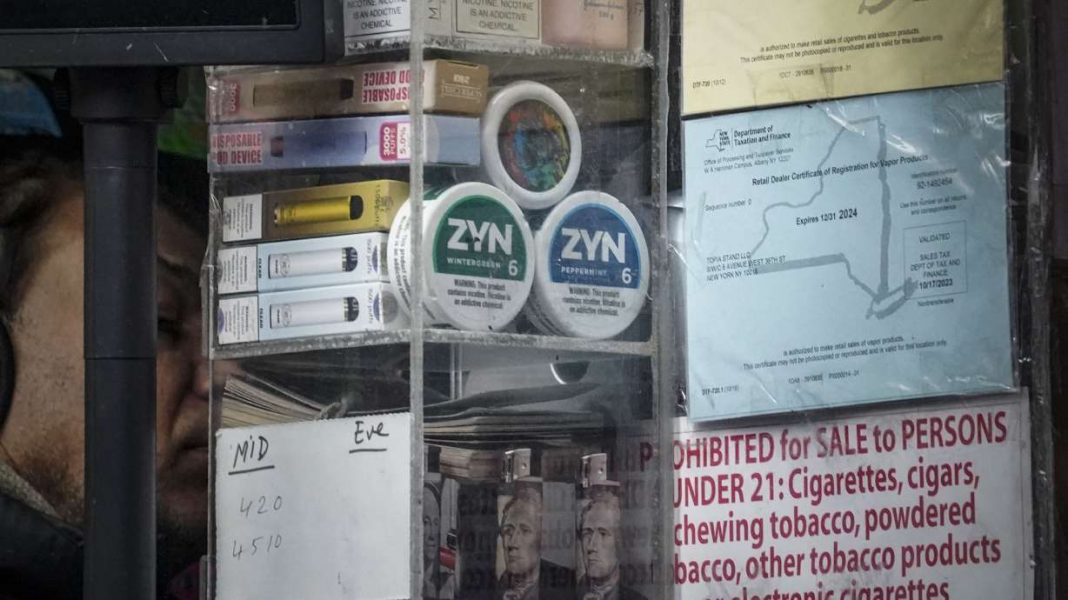WASHINGTON — The latest buzz in the tobacco industry is Zyn, a small pouch filled with nicotine and flavoring. This simple product has sparked a complex debate among politicians, parents, and commentators, reflecting the intricate landscape where Big Tobacco companies are pushing alternative products, while experts grapple with their potential advantages and drawbacks.
Zyn, marketed by Philip Morris International to adult tobacco users, comes in flavors like mint, coffee, and citrus. However, videos of young people using these pouches have garnered millions of views on TikTok and other social media platforms, raising concerns that Zyn could be the next nicotine product to lure underage teens, much like Juul did, leading to a surge in vaping. Some experts argue that the risk is offset by the potential to divert adults from cigarettes and other traditional tobacco products, which are responsible for 480,000 U.S. deaths each year.
Dr. Jasjit Ahluwalia, an addiction specialist at Brown University, argues, “The definition of insanity is doing the same thing and expecting a different result. That’s what we’ve done with tobacco for decades. We’ve been all about abstinence, instead of embracing products that can reduce harm.”
Ahluwalia views nicotine pouches and e-cigarettes as tools to help smokers reduce or quit cigarettes. This approach is common in the U.K., but it’s not mainstream in the U.S., where only pharmaceutical-grade medications like nicotine gum and lozenges are officially approved to aid smokers in quitting.
Ahluwalia points out that Zyn functions similarly to these products: it releases low levels of nicotine that are absorbed into the gums, reducing cravings. The main difference, he notes, is that Zyn is sold by Philip Morris, the global cigarette giant and a longtime adversary of anti-smoking groups.
The controversy surrounding Zyn recently seeped into politics, causing a rift between Democrats and Republicans in Washington and escalating into another battle in the nation’s culture war.
In late January, Democratic Sen. Charles Schumer, of New York, urged regulators to investigate Zyn, citing its appeal to teens. Several House Republicans then warned constituents that “Big Brother” planned to “ban nicotine.”
Conservative commentator Tucker Carlson, a Zyn user, joined the debate, stating: “Zyn is not a sin,” and promoting its unproven benefits, like “enhancing male vitality and mental acuity.”
Zyn users have quickly developed their own online jargon, including “zynnies,” “zynner” and “zynsky.”
“There’s this online subculture around Zyn that’s been spearheaded by younger males, but a lot of that’s not coming from the brand itself,” said Ollie Ganz, a Rutgers University tobacco and nicotine researcher.
Online videos show young people documenting their first experiences trying Zyn, reviewing different flavor combinations and displaying piles of used canisters.
“It’s concerning to see the countless Zyn-related memes and hashtags that are being amplified and normalized across social media,” said Kathy Crosby, CEO of the Truth Initiative, an anti-tobacco advocacy group.
Truth and other groups point to research suggesting nicotine can interfere with brain development in adolescents.
It’s the Food and Drug Administration’s job to balance Zyn’s risks to youngsters against its potential to help adults.
In a statement, an FDA spokesman said the agency is monitoring underage use, noting that 1.5% of high school and middle schoolers reported using pouches last year. That’s well below the 10% who used e-cigarettes.
FDA officials have allowed Zyn to stay on the market while they review Philip Morris’ marketing application, which has been pending since 2020. If teen use remains low, the company could win FDA authorization for at least some of its offerings, which come in multiple strengths and flavors.
In 2019, the FDA awarded its first-ever reduced risk designation to a similar product: snus, a tobacco pouch popular in Sweden that contains lower levels of carcinogens than cigarettes. The FDA said smokers who switch to snus reduce their risk of lung cancer, bronchitis and other diseases.
Zyn excludes the tobacco leaves found in snus, leaving only nicotine, which Philip Morris says increases its appeal.
“People can be reluctant to move into an oral tobacco product if they view it as similar to traditional chewing tobacco,” company spokesman Corey Henry said. “Consumer acceptability is a big part of Zyn.”
Philip Morris doesn’t use online influencers or endorsements to promote Zyn, Henry said. Its website is restricted to adults 21 and older. And flavors like cinnamon and peppermint are “familiar to adults,” Henry said.
Zyn launched in the U.S. in 2014, but sales have skyrocketed in the past year, generating $1.8 billion as shipments accelerated year-over-year by over 60%.
On a November call with retailers, one company executive called the growth “gonzo” and “lights out.”
“I didn’t see this coming. I don’t know anyone who did,” said Joseph Teller, a director for oral tobacco products.
Zyn promotions emphasize the pouches’ discreet, convenient nature as a “smoke-free,” “spit-free” alternative for smokers “at work” or “on the move.”
But to fulfill the company’s stated goal of a “smoke-free future,” Zyn will need to help users fully switch from cigarettes, rather than alternating between the two.
There’s little data on switching, and preliminary research suggests pouches may not be a great substitute.
Ohio State University researchers recently found it took smokers 30 minutes to an hour to get enough nicotine from Zyn to relieve their cravings. With cigarettes, smokers achieved the same nicotine levels — and relief — in five minutes.




Agree – It’s concerning how easily accessible nicotine products are to young people on social media platforms. This debate is necessary for addressing the health risks associated with these products.
Disagree – There are bigger issues to focus on than nicotine pouches on TikTok. Let’s prioritize more pressing matters in health policy debates.
Agree – It’s crucial to address the impact of easy access to nicotine products on social media, especially among younger audiences. #healthpolicy #nicotine #TikTok